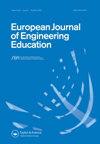通过教师对工程教育的概念和经验进行多学科教育
IF 2.8
Q2 EDUCATION & EDUCATIONAL RESEARCH
引用次数: 0
摘要
摘要工程教育已经变得越来越多学科化,以培养未来的专家超越学科界限,共同构建解决方案,解决重大挑战。然而,在文献中,教员的观点和经历在很大程度上被忽视了。为了理解和支持教师,本研究调查了教师对多学科、跨学科和跨学科教育的概念。我们对来自工程、商业、艺术和设计的13名教员进行了半结构化访谈,他们在多学科教学、课程设计和项目管理方面有着丰富的经验。我们发现,虽然一些教员将多学科教育概念化为一个包罗万象的概念,但大多数教员使用学科整合来区分多学科、跨学科和跨学科教育。然而,他们对多学科、跨学科和跨学科教育之间差异的概念是微妙的。总结课程设计不同方面的细微差别,我们提出了一种类型学来展示教师课程设计的多样性。通过识别教员概念的多样性和复杂性,本研究试图帮助教员深入了解他们的概念和实践,并支持工程教育工作者设计学科整合的课程。本文章由计算机程序翻译,如有差异,请以英文原文为准。
Multidisciplinary education through faculty members’ conceptualisations of and experiences in engineering education
ABSTRACT Engineering education has become increasingly multidisciplinary in order to prepare future experts to transcend disciplinary boundaries and to co-construct solutions to solve grand challenges. However, faculty members’ perspectives and experiences have been largely ignored in the literature. To understand and support faculty members, the present study investigated faculty members’ conceptualisations of multi-, inter-, and transdisciplinary education. We conducted semi-structured interviews with 13 faculty members from engineering, business, art and design with varied experiences with multidisciplinary teaching, course design, and programme management. We found that while some faculty members conceptualised multidisciplinary education as an encompassing concept, most used disciplinary integration to distinguish multi-, inter-, and transdisciplinary education. However, their conceptualisations of the differences between multi-, inter-, and transdisciplinary education were nuanced. Summarising the perceived nuances in different aspects of course design, we propose a typology to demonstrate the variety of types in faculty members’ course design. By identifying the diversity and complexities of faculty members’ conceptualisations, this study attempts to help faculty members achieve an in-depth understanding of their conceptualisations and practices, as well as support engineering educators in designing courses with disciplinary integration.
求助全文
通过发布文献求助,成功后即可免费获取论文全文。
去求助
来源期刊

European Journal of Engineering Education
EDUCATION & EDUCATIONAL RESEARCH-
CiteScore
7.30
自引率
13.00%
发文量
64
期刊介绍:
European Journal of Engineering Education is published six times a year in print and electronic editions and provides an essential forum for dialogue between researchers and specialists in the field of engineering education, at European and worldwide levels. European Journal of Engineering Education is the Official Journal of SEFI, the Socièté Européenne pour la Formation des Ingénieurs (the European Society for Engineering Education). SEFI is a non-governmental organization whose aims are to develop information about engineering education, to improve communication and exchange between professors, researchers and students and to promote cooperation between the various institutions concerned with engineering education.
 求助内容:
求助内容: 应助结果提醒方式:
应助结果提醒方式:


